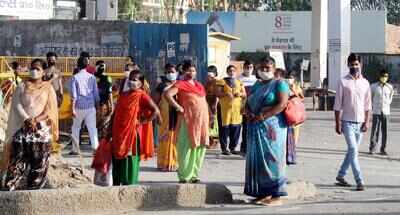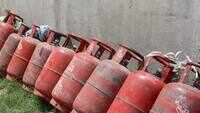
Gurgaon: The Haryana government said it has reopened its borders with Delhi. The Delhi government said it has sealed its borders with NCR cities. And factory workers trying to cross the border to get to work were the ones left in the lurch on Monday.
“Police ask for movement passes. But if factories want us to turn up, can they not get us passes? It is our responsibility to get there somehow. And if we don’t, we lose the day’s wages,” said Aarti, a migrant worker from Bihar who had stayed on in hopes of work resuming. Work did resume, but getting there has not been easy. And the rules keep changing.
On Sunday night, the state government had said inter-district and inter-state movement was allowed. The Centre had recommended the same on Saturday. On Monday morning, Aarti, along with several others, had walked to the Kapashera border to get to work. But with no movement pass, she was turned away. Some jumped over walls to get to the farmlands along the stretch and walk to the factories on the other side. But Aarti made her way home.
The gap between the passing of an order and its implementation means obfuscation. “We are never sure what we are expected to do. I woke up at 3am to get to work by dodging cops and border checks. Should it be this hard to get to work?” asked Gama Prasad, a migrant worker from Uttar Pradesh who works at a factory in Udyog Vihar.
By Monday afternoon, the rules had changed again. The Delhi government said it is sealing its borders for a week and only those engaged in essential services would be allowed to cross over.
Industrialists and factory owners said workers cannot be stopped at the border if the economy has to be revived. “There is a huge gap between what the Centre says and what happens on the ground. All factories in NCR rely heavily on cross-border movement of workers and vehicles. If borders are sealed, there is no point trying to correct the downward trend of the economy,” said Bhunesh Seth, vice chairperson of Exports Promotion Council of EOUs and SEZs. “Working in this unpredictable environment has become a bureaucratic nightmare.”
As for getting passes for workers, industrialists said it may not be feasible. “To get passes, factories need to ensure workers stay put in the city. Daily movement is not allowed even with passes. It was manageable when just 10-20% workers were allowed. Now that 100% workforce can turn up in orange zones, it’s simply impractical,” said N Mangla, president of the Gurugram Industrial Association. “We don’t have that kind of residential capacity and workers would not want to leave their families behind.”
The association has written to chief minister Manohar Lal Khattar to allow more Floor Area Ratio to build residential units for employees. “We have to live with Covid and the unpredictability of SOPs for businesses,” Mangla added.
“Police ask for movement passes. But if factories want us to turn up, can they not get us passes? It is our responsibility to get there somehow. And if we don’t, we lose the day’s wages,” said Aarti, a migrant worker from Bihar who had stayed on in hopes of work resuming. Work did resume, but getting there has not been easy. And the rules keep changing.
On Sunday night, the state government had said inter-district and inter-state movement was allowed. The Centre had recommended the same on Saturday. On Monday morning, Aarti, along with several others, had walked to the Kapashera border to get to work. But with no movement pass, she was turned away. Some jumped over walls to get to the farmlands along the stretch and walk to the factories on the other side. But Aarti made her way home.
The gap between the passing of an order and its implementation means obfuscation. “We are never sure what we are expected to do. I woke up at 3am to get to work by dodging cops and border checks. Should it be this hard to get to work?” asked Gama Prasad, a migrant worker from Uttar Pradesh who works at a factory in Udyog Vihar.
By Monday afternoon, the rules had changed again. The Delhi government said it is sealing its borders for a week and only those engaged in essential services would be allowed to cross over.
Industrialists and factory owners said workers cannot be stopped at the border if the economy has to be revived. “There is a huge gap between what the Centre says and what happens on the ground. All factories in NCR rely heavily on cross-border movement of workers and vehicles. If borders are sealed, there is no point trying to correct the downward trend of the economy,” said Bhunesh Seth, vice chairperson of Exports Promotion Council of EOUs and SEZs. “Working in this unpredictable environment has become a bureaucratic nightmare.”
As for getting passes for workers, industrialists said it may not be feasible. “To get passes, factories need to ensure workers stay put in the city. Daily movement is not allowed even with passes. It was manageable when just 10-20% workers were allowed. Now that 100% workforce can turn up in orange zones, it’s simply impractical,” said N Mangla, president of the Gurugram Industrial Association. “We don’t have that kind of residential capacity and workers would not want to leave their families behind.”
The association has written to chief minister Manohar Lal Khattar to allow more Floor Area Ratio to build residential units for employees. “We have to live with Covid and the unpredictability of SOPs for businesses,” Mangla added.

Coronavirus outbreak
Trending Topics
LATEST VIDEOS
City
 Watch: Video proof of Pak diplomat spying with a decoy sent by the Indian Intelligence Agency
Watch: Video proof of Pak diplomat spying with a decoy sent by the Indian Intelligence Agency  Unlock 1.0: Non-subsidized LPG gas price hiked by Rs 11.50 in Delhi
Unlock 1.0: Non-subsidized LPG gas price hiked by Rs 11.50 in Delhi  Covid-19 crisis and lockdown: Delhi CM Arvind Kejriwal seeks public suggestions
Covid-19 crisis and lockdown: Delhi CM Arvind Kejriwal seeks public suggestions  India unlocks: Guidelines issued to taxi services operating to and from Delhi Airport
India unlocks: Guidelines issued to taxi services operating to and from Delhi Airport
More from TOI
Navbharat Times
Featured Today in Travel
Quick Links
Kerala Coronavirus Helpline NumberHaryana Coronavirus Helpline NumberUP Coronavirus Helpline NumberBareilly NewsBhopal NewsCoronavirus in DelhiCoronavirus in HyderabadCoronavirus in IndiaCoronavirus symptomsCoronavirusRajasthan Coronavirus Helpline NumberAditya ThackerayShiv SenaFire in MumbaiAP Coronavirus Helpline NumberArvind KejriwalJammu Kashmir Coronavirus Helpline NumberSrinagar encounter
Get the app



